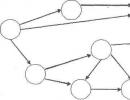Temporal conjunctions in English. Conjunctions in English and what they connect
Use of conjunctions Use of conjunctions
Note: Before studying this material, it is recommended that you read the material " ".
Tables use of conjunctions in English
1. Coordinate conjunctions/coordinators
A. Copulative conjunctions
| connecting union | Translation | Example | Translation |
|
and
[ænd] |
And ; A | This terrain is wide and beautiful. | This area is spacious And beautiful. |
|
as well as
[æz wel æz] |
and ; at the same time | Robert has bought a bouquet of red roses as well as a box of chocolates. | Robert bought a bouquet of red roses, and box of chocolates |
|
both ... and
|
and... and ; both... and | This car is both beautiful and powerful. | This car And Beautiful And powerful. |
|
not only...but also
|
not only but | This car is not only beautiful but also powerful. | This car Not only Beautiful, but also powerful. |
|
neither ... nor
[?na?ð?(r) ... n??(r)] |
no no | Jessica can't fulfill this work neither today nor tomorrow. | Jessica can't do the job neither Today, neither Tomorrow. |
b. Adversative conjunctions
| A nasty union | Translation | Example | Translation |
|
but
|
But ; A | Colin wants to buy this watches but he has little money. | Colin wants to buy this watch, But he doesn't have much money. |
|
yet
|
nevertheless ; however ; But at the same time | Jordan came into the room yet nobody noticed him. | John entered the room however no one noticed him. |
|
while
|
Bye ; while | Linda walks while Ashton works. | Linda is walking Bye/while Ashton is working. |
|
except
[?k?sept] |
if not | Who can do it except you? | Who can do this If not you? |
V. Disjunctive conjunctions
| Separation Union | Translation | Example | Translation |
|
or
[??(r)] |
or ; otherwise | Bruce has to visit her or she resents. | Bruce should visit her or/otherwise she will be offended. |
|
either ... or
[?a?ð?(r)(British)/?i?ð?(r)(Amer.) ... ??(r)] |
or either ; or or | He should say it to Hannah either by phone or by letter. | He should tell Hannah about this or by phone, or in a letter. |
2. Subordinate conjunctions
| Subordinating conjunction | Translation | Example | Translation |
|
that
[ðæt] |
What ; to | George told me that he met an old friend from his school. Note: In such sentences it is possible to omit the conjunction that: Kevin told me he met an old friend from his school. |
J said, What he met an old school friend. |
|
after
[???ft?(r)] |
after | Kevin went shopping after he had breakfast. | Kevin went shopping after had breakfast. |
|
before
[b??f??(r)] |
before as | Kevin had breakfast before he went shopping. | Kevin had breakfast before as went shopping. |
|
unless
[?n?les] |
if not ; not yet | Unless you tell me the reason I won't go anywhere. | If/Bye You Not give me a reason, I won't go anywhere. |
|
as
[æz] |
because ; what | We did exactly as he wanted. Note: In such sentences it is possible to omit the conjunction that: We did exactly he wanted. |
We did exactly that because he wanted |
|
as ... as
[æz...æz] |
as well as | Jonathan runs as fast as Henry. | Jonathan is running Also fast, like Henry. |
|
as long as
[æz l?? æz] |
until ; Bye | He will work there as long as he finds another job. | He will work there until/Bye won't find another job. |
|
as soon as
[æz su?n æz] |
as soon as | He will visit you as soon as he comes back to the city. | He will visit you as soon as will return to the city. |
|
since
|
since ; because ; because the | They have been partners since they got this job. | They are partners since got this job. |
|
because
|
because ; because | I like reading because it is the way to discover something new. | I enjoy reading, because it's a way to learn something new. |
|
until
[?n?t?l] |
until | He must learn it until he keeps it in his mind. | He must learn this until won't remember. |
3. Conjunctive words. A conjunctive word differs from a conjunction in that it can be a conjunction and at the same time a member of a sentence in a subordinate clause. Conjunctive words can be adverbs and relative pronouns.
| Conjunctive words | Translation | Example | Translation |
| A. Adverbs | |||
|
when
|
When | I came back to the place where I used to play football when I was a little boy. | I'm back to the place Where I played football, When was a little boy. |
|
where
|
Where | ||
|
how
|
How | Electrician can explain you how it works. | An electrician can explain it to you How it works. |
|
why
|
Why | This is why I've come back. | This That, why I came back. |
| b. Relative pronouns | |||
|
that
[ðæt] |
which ; What | What if I told you that I was the person who could solve your problem? | What if I said What Am I the right person who could solve your problem? |
|
who
|
Who ; which | ||
|
what
|
What | Peter doesn't know what is prepared for his birthday. | Peter doesn't know What prepared for his birthday. |
|
which
|
which | The cd disk which you are asking for is already bought. | CD, pro which you ask, already purchased. |
|
whose
[hu?z] |
whose ; which | Daniel is talking about a writer whose books were sold all over the world. | Daniel talks about the writer, whose the books were sold all over the world. |
By studying English grammar, we get acquainted with independent ( notational parts of the speech) and service ( functional parts of the speech) parts of speech. The former are known to have independent meaning and can perform different syntactic roles in a sentence. But the latter do not have independent meaning, but only connect words and sentences, sometimes strengthen or define the meanings of other words. Functional parts of speech include conjunctions, particles, and exclamations. The first indicated auxiliary part of speech, that is union(conjunction ), and is the subject of our discussion in this article.
What is "conjunction" in English?
As we have already said, this is a service part of speech that helps to formalize the connection between parts of a complex sentence, between individual sentences in the text, as well as between words in a simple sentence. If we are talking about the form of conjunctions in English, we note that in this case they can be simple, complex And composite. Judging by the names, it can be assumed that simple ( simple) represent one word ( and, but, or), complex ( compound) are expressed using two simple conjunctions ( wherever, however), and composites ( composite) are designed as a combination of function and significant words ( as well as, in order that).
If we are talking about the function that conjunctions perform in the English language, do not forget that all existing conjunctions can be divided into two groups: ( coordinating ) And ( subordinating ). The first ones are needed to connect homogeneous members of a sentence or simply independent sentences as part of a complex sentence. Subordinating conjunctions in English serve to join a subordinating sentence to the main sentence in a complex sentence.
In turn, considering a more detailed classification of conjunctions in the English language, we see that coordinating conjunctions there are:
- connecting / copulative
(and, as well as, both…and and others)
It was all dark overhead and in front of her there was a long passage. (and– in the meaning “and”)
Both Tom and Ann were late.
He neither wrote nor phoned.
- adversative / adversative
(and, but, yet, however and others)
Henry lived in a small town, but then he got a job in a big city and moved there with his wife.
The waters of the sea were deep, yet clear.
- dividing / disjunctive
(or, either…or)
He was not quick either of vision or conception.
Be polite or you’ll miss your chance!
- cause-and-effect / causative-consecutive
(for, so)
She missed the plane for her car broke down.
Subordinating conjunctions in English they are more diverse, therefore they have twice as many classifications. The main groups of subordinating conjunctions in English are the following:
- explanatory (that, whether, if)
He suggested that we should give him the time to think over the problem. (that – what, in order to)
I do not care whether she comes to the party or not.
- temporary (when, as soon as, till, before, while and others)
Dinner will be served at 7.30 after the guests arrive.
What have you been doing since you were fired from work?
- causal (as, because, since and others)
Farmers must rise early since they have so much work to do. (since – since, since)
The government requires warnings on cigarettes because smoking isn’t good for your health.
- targeted (in order that, so that and others)
I will lend you my car so that you fill it up with petrol.
He put on his glasses in order that he could see better.
- conditional (if, unless, provided/providing that, supposing, once and others)
Please, come by my house if you get a chance.
She’d be very attractive provided that she lost all that weight.
- concessionary (though, although)
He was gay though tired.
We still went to the beach although the sun wasn’t shining.
- mode of action and comparison (as if, so...as, as...as, than,the…the and others)
He shook his head a bit as if in wonder that he had permitted himself this behavior.
The more I think about it the more nervous I become.
- consequences(so...that, that)
She arrived early so that she could help me prepare the meal.
Conjunctions are words that we use to connect two or more sentences, or two words (members of sentences) together in one specific sentence.
The conjunction itself is not a member of the sentence. The most common conjunctions in English are the following: and, or, but, nor, for.
Examples:
She eats at canteen and works in the trade pavilion (She eats in the canteen and works in the trade pavilion). In this example, the conjunction “and” connects the sentence “she eats at canteen” with the sentence “works in the trade pavilion.”
In English, depending on the function in a sentence, there are two basic types of conjunctions:
Essay;
Subordinate.
Coordinating Conjunctions
Coordinating conjunctions are used to connect two sentences that play an equally important role in our statement and describe actions that have an equal degree of significance. In other words, coordinating conjunctions join two simple sentences into a complex one, thereby forming a compound sentence.
Table of coordinating conjunctions in English:
Example:
We went to the beach but the sea was cold (We went to the beach, but the sea was cold).
In the example above, we used the coordinating conjunction “but” to connect two different sentences “We went to the beach” and “the sea was cold.”
Subordinating conjunctions
Conjunctions in English, represented by subordinating conjunctions, are used to connect two sentences when one of them depends on the other. In other words, this type of conjunction is used in the formation of complex sentences, where one of the sentences is the main one, and the other is a dependent (subordinate) one. Most conjunctions in English are subordinating conjunctions.
Table of the most common subordinating conjunctions in English:
It is worth noting that subordinate or dependent clauses “depend” on the main or independent clause. They cannot exist separately, because in this case they will lose their meaning.
For example, the sentence " Although I work hard I'm still sick"(Even though I work hard, I am still sick). Separately taken subordinate clause " Although I work hard" (even though I work hard) doesn't make any sense. But the main (independent) clause can be used on its own: “ I'm still sick"(I'm still sick).
Example:
This is the film that I told you about yesterday (This is the film that I told you about yesterday)
In this example, the subordinating conjunction “that” (which) is the introductory clause in the subordinate clause “I told you about yesterday” (I told you yesterday), which depends on the first, main clause “This is the film” (this is a film).
Location of conjunctions in a sentence
Coordinating conjunctions are usually found between clauses or two separate clauses that they connect.
Subordinating conjunctions usually come at the beginning of a subordinate clause.
Conjunctions have a special place in English grammar. Thanks to them, you can combine short sentences and monosyllabic phrases into longer and more meaningful ones. Correct use of conjunctions will help you improve not only your oral but also your written speech. We will talk about what kind of conjunctions there are and what function they perform in the English language in our article.
What is a conjunction in English?
A union or conjunction is an auxiliary part of speech that logically connects words, phrases and parts of a sentence. Conjunctions in English are different in that they do not change and do not depend on any grammatical characteristics of the words being connected.
Conjunctions can be classified by structure or function in a sentence.
English conjunctions by structure:

English conjunctions by their function in a sentence
It is believed that English conjunctions are divided into two large groups: coordinating and subordinating. Some researchers of English grammar distinguish another group - correlative conjunctions (or correlative). Typical representatives of this group are our friends such as “neither... not”, “not only... but also” and so on. But we will talk about them when we remember the writing group.
Coordinating Conjunctions
Coordinating conjunctions in English (or Coordinating Conjunctions) connect individual words, phrases or equal clauses as part of a complex sentence. They indicate the semantic equality of units that are connected thanks to them.
Of course, such conjunctions are divided into their own subgroups, depending on what function they perform in the sentence.

Subordinating conjunctions
Subordinating conjunctions in English (or Subordinating conjunctions) connect the subordinate clause with the main clause. This is how we get complex sentences. There are quite a lot of such words in the English language. They are divided into subgroups, depending on what type of subordinate clause introduces the given word.

English Conjunction Table
It was all a little boring, but necessary theory of English grammar. At the end, we want to give a table of English conjunctions that are used most often.
and - and
also - also
as - how, in quality, since, when
as…. as - also...as
because - because
both…. and - how…. so and
but - but, except
either… or - or…. or
neither... nor - neither... nor
however - however
if - if
in order - in order to
in case - in case
moreover - moreover
nevertheless - nevertheless
or - or
otherwise - otherwise
once - once (already)
so... that - so that
so... as - so that
that - something that
therefore - therefore
than - than
although - although
thus - in this way
unless - if.., not
while - while
whether...
yet - however
like - like
lest - so as not to, no matter how not
unlike - not like
with - with
according to - according to something
in spite of - despite…
meanwhile - meanwhile
as if, as though - as if
as long as - until…. .
as soon as - as soon as
on condition - provided that

Shutikova Anna
Paired unions neither ... nor, either ... or, both ... and in English
neither ... nor - no no;
either ... or - or... or, either... or ;
both ... and - and... and, like... and .
neither...nor - neither...nor
* negative conjunction
* connects homogeneous members of a sentence (subjects, predicates, objects, definitions).
* the predicate is put in the affirmative form
*when connecting subjects, it agrees with the nearest of them.
Neither Jane nor her husbandanswered this question (conjunction connects subjects) - Neither Jane nor herThe husband did not answer this question.
We brought neither apples nor oranges (conjunction connects complements) - We brought neither apples nor oranges.
We will neither buy, nor rent a house. (a conjunction connects predicates) - We will neither buy nor rent a house.
Our house is neither old nor new (conjunction connects definitions) - Our house is neither old nor new.
If the union neither ... nor connects subjects, then the predicate agrees with the nearest one . (However, this rule is often not observed, and the predicate is often put in the plural.)
Neither my sisters nor my brother wants to go to a disco. - Neither my sisters nor my brother want to go to the disco. (the predicate agrees with the nearest subject).
Neither my sisters nor my brother wants to go to a disco. - Neither my sisters nor my brother want to go to the disco. (the predicate is in the plural - this translation option is usually used).
either... or - or... or, either... or
* used in affirmative sentences (sometimes in negative sentences)
* connects homogeneous members.
* when connecting subjects, it agrees with the nearest of them.
We will go either to Italy or to Spain. We will go either to Italy or to Spain.
Come either tomorrow or on Monday. Come either tomorrow or Monday.
Either her sisters or her husband is arriving tonight. Or her sisters, or her husband arrives tonight.
Either her husband or her sisters are arriving tonight. Either her husband or her sisters are coming Today.
If either does not refer to the subject, then it can be placed before the predicate verb.
They will either build a restaurant or a shopping center in this district - They will build either a restaurant or a shopping center in this district.
In negative sentences, either ... or is sometimes used instead of neither ... nor.
We didn't buy either bananas or pears - We didn’t buy any bananas or pears.
both ... and - and... and, both... and
* used in affirmative sentences
* connects homogeneous parts of a sentence
* when connecting subjects, the predicate is placed in the plural
I like both apples and peaches. I love both apples and peaches.
We will go to both England and the USA. We will go to both England and the USA.
Both my sister and my brother live in this city. Both my sister and my brother live in this city.
Video on the topic from native speaker (very useful to watch and listen to)
Exercises






